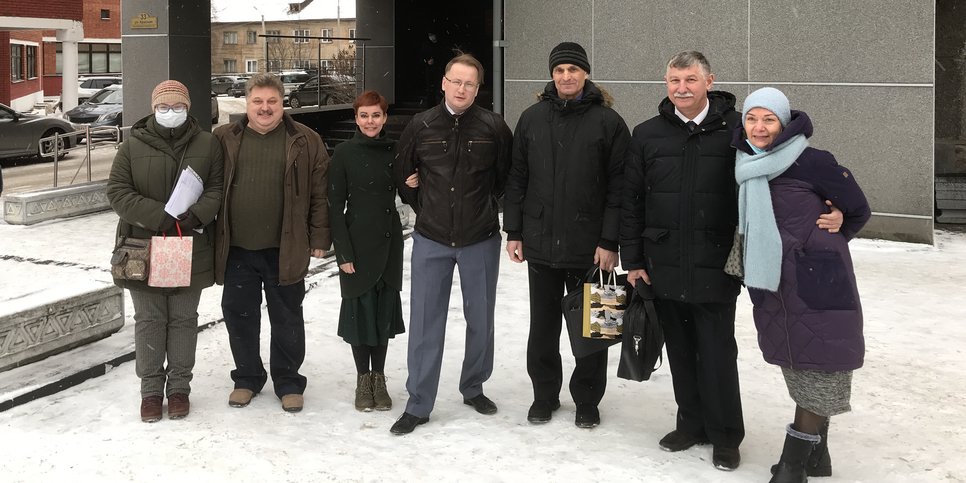From left to right: Dmitriy Ravnushkin with his daughter Anastasiya, Maxim Amosov with his wife Mariya, Mikhail Gordeev and Nikolay Leshchenko with his wife Svetlana at the courthouse. November 2021
From left to right: Dmitriy Ravnushkin with his daughter Anastasiya, Maxim Amosov with his wife Mariya, Mikhail Gordeev and Nikolay Leshchenko with his wife Svetlana at the courthouse. November 2021
On July 28, 2023, Stepan Sergeev, judge of the Petrozavodsk City Court of the Republic of Karelia, fined Maksim Amosov, Nikolay Leshchenko and Dmitriy Ravnushkin 500,000 rubles each, and Mikhail Gordeev 450,000 rubles. They were found guilty of extremism for participating in religious meetings of Jehovah's Witnesses.
The believers disagree with the verdict. In court, they emphasized that the meetings for worship were exclusively peaceful in nature and were "driven by the motive to fulfill the commands recorded in the Bible."
The criminal case was initiated by the FSB division for Karelia in July 2019. In the same month, a raid took place in the homes of local Jehovah's Witnesses in Petrozavodsk. Several believers were charged with organizing the activity of an extremist organization (Article 282.2(1) of the RF CrC). A recognizance agreement was taken from Maksim Amosov, and later also from Nikolay Leshchenko. Within three months, new defendants appeared in the case: Mikhail Gordeev and Dmitriy Ravnushkin. FSB officers searched their places of work. They were placed under a recognizance agreement.
The first court hearing took place in October 2021. However, six months later, the judge was replaced and the proceedings began anew. As emphasized by the defense, the position of the prosecution was untenable. Thus, contrary to the allegations of the prosecution, a linguistic expert study proved that in the conversations of the believers "there are no statements regarding the superiority or negative evaluation of one person or group of persons over other people on religious grounds."
Testimonies from witnesses for the prosecution were favorable toward the defendants — they were characterized positively, praised for their professionalism, peacefulness, responsiveness and willingness to help. The director of the institution in which Amosov worked, said about him: “You can rely on him one hundred percent. I have never seen a better employee.”
According to the convicted persons, despite the difficulties that the criminal prosecution has created — bank cards being blocked, some being fired from work — they try to maintain a positive attitude. Nikolay Leshchenko said, fellow believers provided particular support to his family: “Some traveled more than a thousand kilometers to encourage us and bring food.” Mikhail Gordeev said: “Although my family and I are distressed due to the unfair treatment, we realize that we are being prosecuted only because of our faith. As a result, it only gets stronger.”
This is already the second conviction of Jehovah's Witnesses in Karelia. Human rights activists condemn religious repressions against Jehovah's Witnesses in Russia. The European Court of Human Rights found these prosecutions groundless and unlawful.




